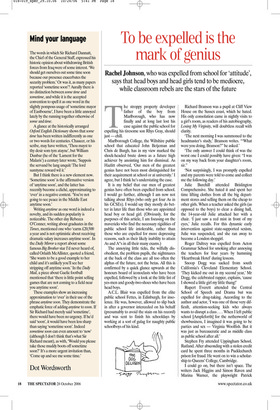To be expelled is the mark of genius
Rachel Johnson, who was expelled from school for ‘attitude’, says that head boys and head girls tend to be mediocre, while classroom rebels are the stars of the future The stroppy property developer father of the boy from Marlborough, who has now finally and at long last lost his case against the public school for expelling his tiresome son Rhys Gray, should just — chill.
Marlborough College, the Wiltshire public school that educated John Betjeman and Chris de Burgh, has in my view marked the shock-headed brute down as a future high achiever by anointing him for dismissal. As Hazlitt observed, ‘Our men of the greatest genius have not been most distinguished for their acquirement at school or at university.’ I agree, but I think he’s understating the case.
It is my belief that our men of greatest genius have often been expelled from school. I would go further, although I am now not talking about Rhys (who only got four As in his GCSEs). I would say they mostly do better in later life than those who are appointed head boy or head girl. (Obviously, for the purposes of this article, I am focusing on the mavericks who find the necessary rigidities of public school life intolerable, rather than those who are expelled for more depressing reasons, such as their likely inability to attain As and A*s in all their many exams.) The annoying little ticks, the wilfully disobedient, the problem pupils, the nightmares at the back of the class are all too often the alphas of the future, not the betas. All this is confirmed by a quick glance upwards at the honours board of iconoclasts who have been expelled, followed by a look at the little list of yes-men and goody-two-shoes who have been head boys.
A.C.L. Blair was expelled from the elite public school Fettes, in Edinburgh, for insolence. He was, however, allowed to slip back in after a governor interceded on his behalf (presumably to avoid the stain on his record) and was sent to finish his schooldays by working at a sort of gulag for naughty public schoolboys of his kind. Richard Branson was a pupil at Cliff View House on the Sussex coast, which he hated. His only consolation came in nightly visits to a girl’s room, as readers of his autobiography, Losing My Virginity, will doubtless recall with clarity.
‘The next morning I was summoned to the headmaster’s study,’ Branson writes. ‘“What were you doing, Branson?” he asked.’ ‘The only answer I could think of was the worst one I could possibly have given: “I was on my way back from your daughter’s room, sir.” ‘Not surprisingly, I was promptly expelled and my parents were told to come and collect me the following day.’ Julie Burchill attended Brislington Comprehensive. She hated it and spent her time lifting clothes from all the big department stores and selling them on the cheap to other girls. When a teacher asked the girls (as opposed to the boys) to clear a dining hall, the 14-year-old Julie attacked her with a chair. ‘I just saw a red mist in front of my eyes,’ Julie recalls. For this dynamic early intervention against state-supported sexism, Julie was suspended, and she ran away to become a London shopgirl.
Roger Daltrey was expelled from Acton Grammar School for smoking after annoying the teachers for four years by humming ‘Heartbreak Hotel’ during lessons.
Snoop Dogg was sacked from south California’s Cleveland Elementary School. ‘They kicked me out in my second year,’ Mr Dogg, the celebrated rapper, explains, ‘cause I showed a little girl my little thang!’ Rupert Everett attended the Central School of Speech and Drama but was expelled for drug-taking. According to the author and actor, ‘I was one of those very difficult, attention-seeking kids who always wants to disrupt a class ... When I left public school [Ampleforth] for the netherworld of showbusiness, I imagined it was going to be parties and sex — Virginia Woolfish. But it was just as bureaucratic and as middle class as public school after all.’ Stephen Fry attended Uppingham School, Rutland. After absconding with a stolen credit card he spent three months in Pucklechurch prison for fraud. He went on to win a scholarship to Queens’ College, Cambridge.
I could go on, but there isn’t space. The writers Jack Higgins and Simon Raven and Marina Warner, the playwright Patrick Marber, the handbag designer Lulu Guinness, the secret agent James Bond, the cad Harry Flashman, the puppeteer Roger Law, the actor Sir John Standing, the diarist Sebastian Shakespeare (who is distinguished for having been expelled from not just one but two schools, the Dragon and Marlborough), the philosopher Roger Scruton. All were, I am reliably informed, forcibly cleansed from their places of ‘learning’. And even if they weren’t expelled, I frankly doubt whether any of the above would complain about being so described. In fact, it’s so chic and counter-culture to have been expelled that many claim to have been even when they haven’t.
‘I like to boast I was expelled from Dartington Hall in spite of not ever being a pupil there,’ admits Toby Young, the writer and critic. ‘In fact, I was banned from the premises after a fight with one of the pupils.’ Also the poet Fiona Pitt-Kethley. ‘I always hoped to get expelled. I was always thought to be very naughty but I didn’t really do anything that terrible. I was sent to a psychiatrist at seven for writing “bum” on my desk.’ So let us turn to those who were covered prematurely with the afflatus of glory and glittering prizes as schoolboys. But before we do, I must get a little related matter out of the way. I was expelled from a minor public school, Bryanston, for ‘attitude’, and being generally irritating for several years. Meanwhile my brilliant brother Boris was cap tain of the school at Eton. I am forced to argue that the pair of us are an exception to the rule.
For Boris, despite the terrible disadvantages of having 1) been to Eton and 2) been captain of the school, has been a total triumph in all he has ever tried to do, while I cannot claim, even with ludicrous false modesty, that expulsion has conferred automatic distinction on moi.
I have asked almost everyone I know but, apart from my brother and my editor Matthew d’Ancona, I can find very few head boys or house captains who have made it to prominence. I am sure there are thousands out there; we’ve just never heard of them. They are fizzlers rather than fizzers.
Michael Howard, the former Tory leader and home secretary, was head boy of Llanelli Grammar; Jack Straw, the former foreign secretary, won the civics prize at Brentwood School, aged 13. Shaun Woodward, the only Labour MP to have a butler (his main claim to fame) was house captain of Bristol Grammar. Oh yes, we must not forget Gordon Brown. The chancellor was a model pupil – indeed a ‘dux’ — at Kirkcaldy High School and rector of Edinburgh University.
What we are forced to conclude is that head-boy types, like typical army chaps, are very nice and get on with everyone, even those in authority, while expellees like to show off (Blair was a frightful show-off) and ‘let themselves down’ as much and as often as they can. Which leaves poor headmasters in a tricky position. Heads these days are grimly aware that their day job is relieving Old Boys of funds for new building projects. By purging their cash-strapped institutions of teenage rebels, they are grimly aware — or should be — that they are thereby sacking their future benefactors. For while their super, super head boys are tremendously sound chaps, they often turn out to be chartered accountants, churchmen, major-generals, and permanent under-secretaries. Not Bransons.
‘I wouldn’t hesitate to expel someone who was unpleasant and disruptive just because they might, somewhere down the line, come up with £5 million,’ says Anthony Seldon, headmaster of Wellington College, who has often noticed how head boys do not end up as head men. ‘Anyway, most heads back mavericks, and will try to retain a free spirit long after the common room has given up in despair.’ And one thing is certain. As soon as an expelled pupil becomes the success he was clearly always destined to be, he will soon receive, sure as night follows day, a begging letter for funds or a request to make a speech at prizegiving or to donate a new science block.
It’s the sure sign in the cursus honorum of English schooldays: bad boys finish first.
Rachel Johnson is a contributing editor of The Spectator.



























































































 Previous page
Previous page